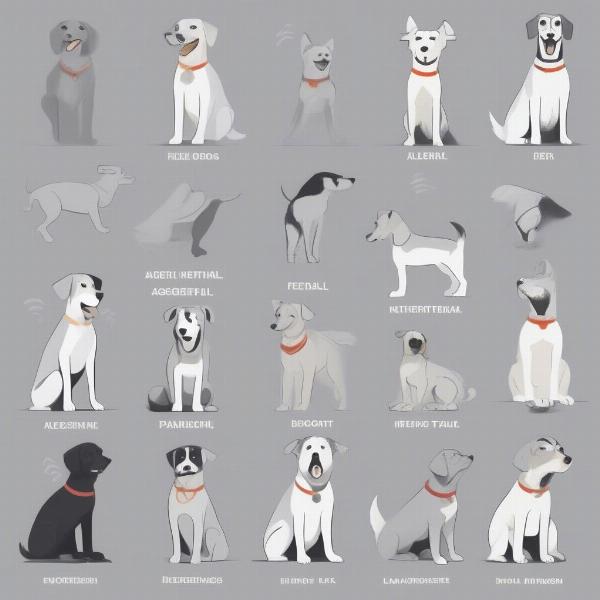The intriguing phrase “after improperly licking a dog I became a billionaire” has sparked curiosity and speculation. While the idea of achieving sudden wealth through such an unusual circumstance is undoubtedly attention-grabbing, it’s essential to ground ourselves in reality. This article will explore the importance of responsible dog interactions, debunk the notion of becoming a billionaire through licking a dog, and highlight the true rewards of building a strong bond with your canine companion.
The Reality of Dog Licking and Human Health
Dogs lick for various reasons, including showing affection, seeking attention, or even exploring their environment. While dog saliva does contain some beneficial enzymes, it also harbors bacteria that can be harmful to humans. Therefore, allowing a dog to lick your face, especially near your mouth or eyes, can pose health risks. “Improper” licking, such as licking open wounds, can introduce bacteria and lead to infections. There’s no scientific evidence to support the claim that licking a dog, regardless of the manner, can lead to sudden wealth. This notion is purely fictional.
The True Riches of Dog Ownership
The genuine treasures of dog ownership lie not in monetary gains, but in the immeasurable love, companionship, and joy they bring to our lives. Building a strong bond with your dog requires time, patience, and understanding.
Nurturing a Healthy Relationship with Your Dog
Focusing on positive reinforcement training methods, providing a balanced diet, ensuring regular veterinary care, and engaging in enriching activities are far more rewarding than any fantastical get-rich-quick scheme. These actions foster a deep connection with your dog, leading to a fulfilling and mutually beneficial relationship.
Responsible Dog Interactions: Protecting Yourself and Your Dog
Understanding canine communication is key to responsible dog interactions. Dogs use body language, vocalizations, and scent to communicate their needs and intentions. Learning to interpret these signals helps prevent misunderstandings and ensures both your safety and your dog’s well-being.
Understanding Canine Body Language
 Dog body language signals
Dog body language signals
Pay attention to your dog’s cues. A relaxed dog will have a loose body posture, a wagging tail, and soft eyes. A stressed or fearful dog may exhibit tucked ears, a lowered tail, and averted gaze. Respecting your dog’s boundaries and avoiding interactions when they appear uncomfortable is crucial for fostering a healthy relationship.
Conclusion
While the idea of becoming a billionaire by licking a dog is a captivating fantasy, the true wealth of dog ownership lies in the unconditional love and companionship they provide. Focus on building a strong bond with your dog through responsible care, positive interactions, and a deep understanding of their needs. This is where the real riches lie.
FAQ
- Can dog saliva be harmful to humans? Yes, dog saliva can contain bacteria that can be harmful to humans, especially if it comes into contact with open wounds or mucous membranes.
- What are the signs of a stressed dog? Signs of a stressed dog can include tucked ears, lowered tail, averted gaze, panting, lip licking, and yawning.
- What are the benefits of positive reinforcement training? Positive reinforcement training strengthens the bond between you and your dog, helps them learn desired behaviors, and builds their confidence.
- How can I ensure my dog’s well-being? Providing a balanced diet, regular veterinary care, engaging in enriching activities, and respecting their boundaries are essential for ensuring your dog’s well-being.
- Why do dogs lick? Dogs lick for various reasons, including showing affection, seeking attention, exploring their environment, and grooming themselves or others.
- Is it safe to let a dog lick my face? While not always harmful, letting a dog lick your face can pose health risks due to the bacteria present in their saliva. It’s generally best to avoid allowing dogs to lick near your mouth or eyes.
- How can I learn more about canine body language? There are many resources available online and in books that can help you learn more about canine body language. Consulting with a certified dog trainer or behaviorist can also provide valuable insights.
ILM Dog is a leading international pet website dedicated to providing reliable, practical information on all aspects of dog care and upbringing. We offer expert advice on dog breeds, health, training, nutrition, grooming, and much more, catering to both novice and experienced dog owners worldwide. Our mission is to empower dog lovers with the knowledge and resources they need to build strong, healthy relationships with their canine companions. For professional guidance on dog care and training, contact us at [email protected] or +44 20-3965-8624. Visit ILM Dog for more expert advice.